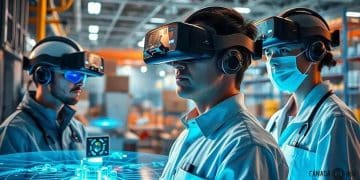Meta’s advancements in augmented reality AI technology

Meta’s advancements in augmented reality AI technology integrate digital and real-world experiences, enhancing user engagement through personalized interactions across various industries like healthcare, retail, and education.
Meta’s advancements in augmented reality AI technology are changing the landscape of digital interactions. Have you ever wondered how these innovations might enhance your daily experiences? Let’s dive into what makes this technology so engaging.
Understanding augmented reality and AI
Understanding augmented reality and AI begins with recognizing how these technologies merge to create immersive experiences. Many of us experience augmented reality daily, often through our smartphones or smart glasses. This innovative technology overlays digital information onto the real world, enhancing how we interact with our environment.
What is Augmented Reality?
Augmented reality (AR) is a blend of digital content with the physical world. Unlike virtual reality, which immerses users in a completely digital environment, AR enhances our real surroundings. Imagine viewing a building through your phone and seeing architectural plans overlaid on it.
How AI Enhances Augmented Reality
Artificial intelligence plays a critical role in making AR more intuitive and responsive. For instance, AI can:
- Improve object recognition, allowing devices to understand their environment better.
- Enhance user interaction through natural language processing.
- Personalize experiences based on user behavior and preferences.
The combination of AI and augmented reality creates opportunities for businesses and consumers alike. Retail stores are using AR to allow customers to visualize furniture in their homes before making a purchase. In education, AR can transform how students learn by providing interactive 3D models to explore.
This blend of technology paves the way for more engaging experiences. As users, we can expect AR to become more integrated into our daily lives, enhancing the way we interact with our surroundings. Meta’s advancements in AR AI technology are at the forefront of this evolution, bringing these ideals closer to reality.
Key advancements by Meta

Key advancements by Meta in the realm of augmented reality are reshaping our digital landscape. Meta has been at the forefront of integrating artificial intelligence with augmented reality, resulting in groundbreaking features that enhance user engagement.
Improving Interaction with Users
One significant advancement involves how users interact with AR applications. By leveraging AI, Meta has developed systems that learn from user behavior. This means that the more we use these applications, the better they become at understanding our needs.
Real-time Object Recognition
Another major leap is in real-time object recognition. AR applications can now identify objects and provide relevant information instantly. Whether it’s a landmark or a product in a store, users get valuable data right at their fingertips. This capability transforms how we explore and interact with our surroundings.
- Instant feedback for users enhances their experience.
- AI continuously improves the accuracy of recognition.
- AR becomes more practical for everyday tasks.
Moreover, Meta’s investment in hardware also plays a crucial role. With devices like smart glasses, they make augmented reality more accessible. These devices are lightweight and user-friendly, allowing users to seamlessly integrate AR into their daily lives.
The continuous evolution of Meta’s technology not only makes experiences richer but also encourages creativity. Developers are inspired to create applications that push boundaries, making everyday encounters more interactive.
As we explore more possibilities, it’s exciting to think about where these advancements will take us. With each innovation, Meta redefines our relationship with technology, providing tools that enhance how we perceive the world.
Real-world applications of AR AI technology
Real-world applications of AR AI technology have revolutionized various industries, making everyday tasks more efficient and interactive. From healthcare to retail, the integration of augmented reality with artificial intelligence provides innovative solutions that enhance user experiences.
Healthcare Innovations
In the medical field, AR AI technology has found promising uses. Surgeons can utilize augmented reality to visualize complex anatomy during operations, reducing risks and improving outcomes. Additionally, medical training has also advanced: students can use AR simulations to practice procedures in a safe environment.
Transforming Retail Experiences
Retailers are harnessing AR AI to transform how customers shop. Virtual fitting rooms allow consumers to try on clothes without leaving their homes. This technology offers a personalized shopping experience by suggesting items based on user preferences.
- Interactive product displays engage customers.
- AR navigation aids users in finding items in-store.
- Enhanced marketing strategies increase customer retention.
Moreover, real estate professionals use AR AI to showcase properties. Virtual tours provide potential buyers with an immersive look at homes, saving time and making the buying process more convenient.
The entertainment industry has also embraced AR AI technologies. Gaming experiences are richer, as players can interact with virtual elements in real-world settings. This blend of gaming and reality creates immersive experiences that captivate users.
Overall, the applications of AR AI technology are endless, paving the way for future innovations that will further integrate into our daily lives. As this technology continues to evolve, we can expect even more creative and practical uses across different sectors.
Challenges in augmented reality AI implementation
Challenges in augmented reality AI implementation are significant and deserve our attention. As exciting as this technology is, it also faces hurdles that can slow down progress and adoption in various sectors.
Technical Limitations
One major challenge involves the technical limitations of current hardware. Many devices may not support the required processing power to run advanced AR applications effectively. This can lead to lag or poor quality in user experiences. As technology advances, the demand for better hardware increases.
User Acceptance and Familiarity
Another concern is user acceptance. Many people may not be familiar with augmented reality, making them hesitant to adopt it. Education is crucial for overcoming this barrier. When users understand the benefits and functionalities of AR AI, they are more likely to embrace it.
- Training and tutorials help users adapt.
- Engaging interfaces can enhance user interest.
- Demonstrations of real-world applications can build trust.
Privacy and security issues also pose significant concerns. With AR technologies needing to collect and analyze data from users and environments, it’s essential to address how this data is used. Users must feel that their information is secure and managed responsibly.
Additionally, developers face challenges in creating content that is both engaging and functional. Not all applications are intuitive, which can lead to frustration and disinterest. Developers need to focus on usability alongside innovative features to create successful applications.
As AR AI technology continues to evolve, addressing these challenges is vital. By focusing on the technical, social, and ethical concerns, developers and companies can create environments that not only foster innovation but also encourage widespread adoption, paving the way for future growth.
The future of AR AI technology and user engagement
The future of AR AI technology is bright, and it holds immense potential for user engagement. As advancements continue, we can expect even more innovative ways to connect with our environments and the digital world.
Personalization and Enhanced User Experience
One promising aspect is the rise of personalized experiences. Future AR applications will be able to analyze user data and preferences, crafting customized interactions. Whether it’s through tailored recommendations or adaptive learning environments, the technology will evolve to meet individual needs.
Integration with Daily Life
Moreover, AR AI will seamlessly integrate into our daily lives. Imagine using smart glasses that provide real-time information about your surroundings without disrupting your focus. This kind of integration will make technology feel natural and intuitive.
- Interactive advertising will enhance engagement.
- Social AR experiences will connect users globally.
- Educational tools will provide immersive learning.
As we look ahead, industries like education, healthcare, and entertainment will benefit greatly from AR AI. In education, for example, students will learn through immersive experiences that make complex ideas easier to grasp.
In healthcare, professionals will benefit from real-time data overlays during surgeries, improving patient outcomes. These advancements will also extend into entertainment, creating more engaging gaming and interactive content.
Collaboration will also play a key role in the future. As teams engage in virtual environments, business operations will become more dynamic and productive. With better tools for collaboration, companies can create innovative solutions faster.
The fusion of AR and AI technology promises a future where interaction is richer and more meaningful. As innovation continues, we will see a world where technology enhances our daily lives, making it easier to connect, learn, and explore.
FAQ – Frequently Asked Questions about Augmented Reality AI Technology
What is augmented reality AI technology?
Augmented reality AI technology combines digital information with the real world, enhancing user experiences by overlaying interactive elements onto real-life environments.
How does AR AI improve user engagement?
AR AI improves user engagement by offering personalized experiences that adapt to individual preferences, making interactions more relevant and immersive.
What industries benefit from AR AI technology?
Several industries benefit from AR AI, including healthcare, education, retail, and entertainment, each utilizing the technology to enhance user experience and operational efficiency.
What challenges does AR AI technology face?
AR AI technology faces challenges such as technical limitations, privacy concerns, and the need for user education to foster acceptance and widespread adoption.





